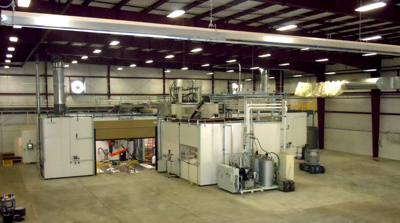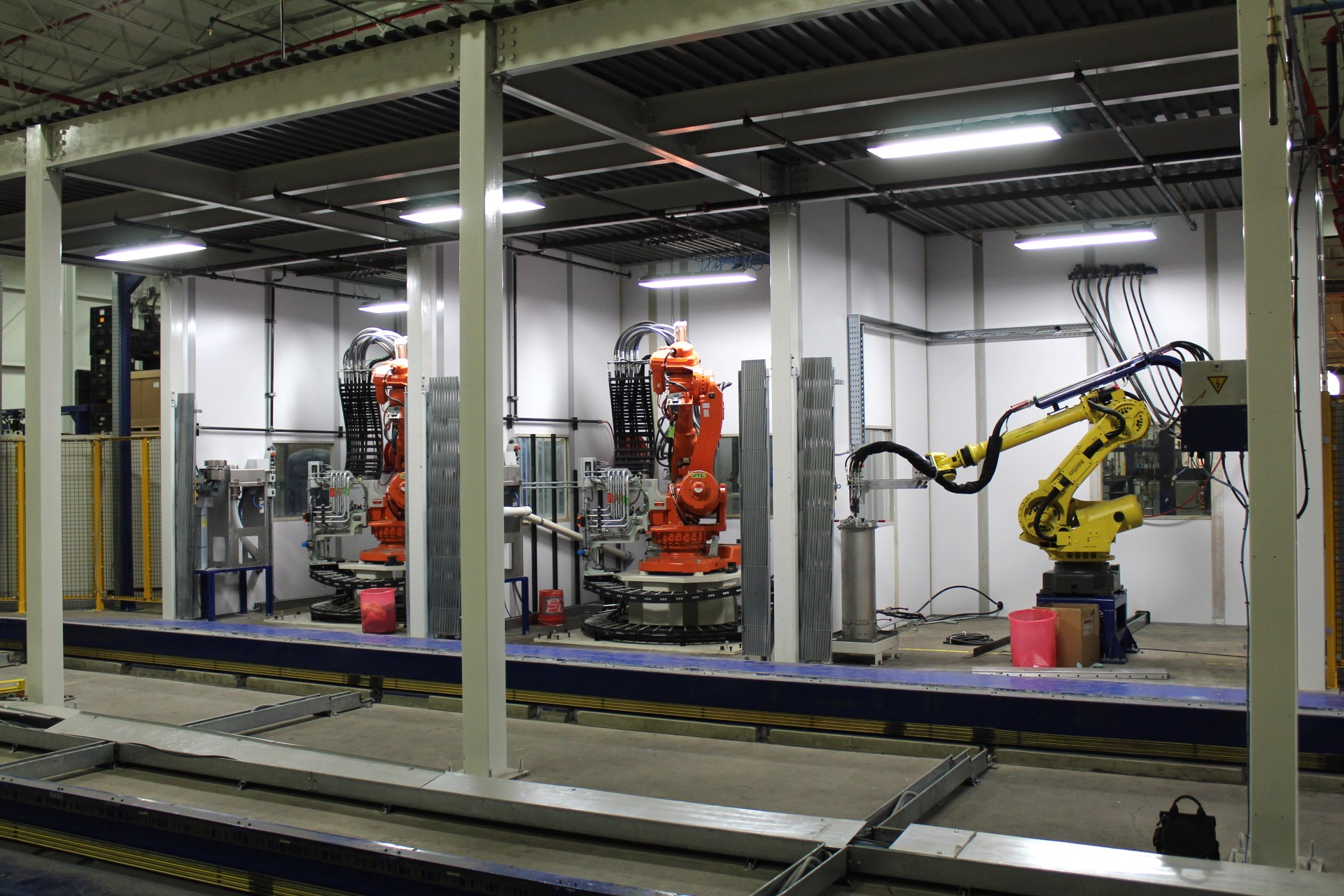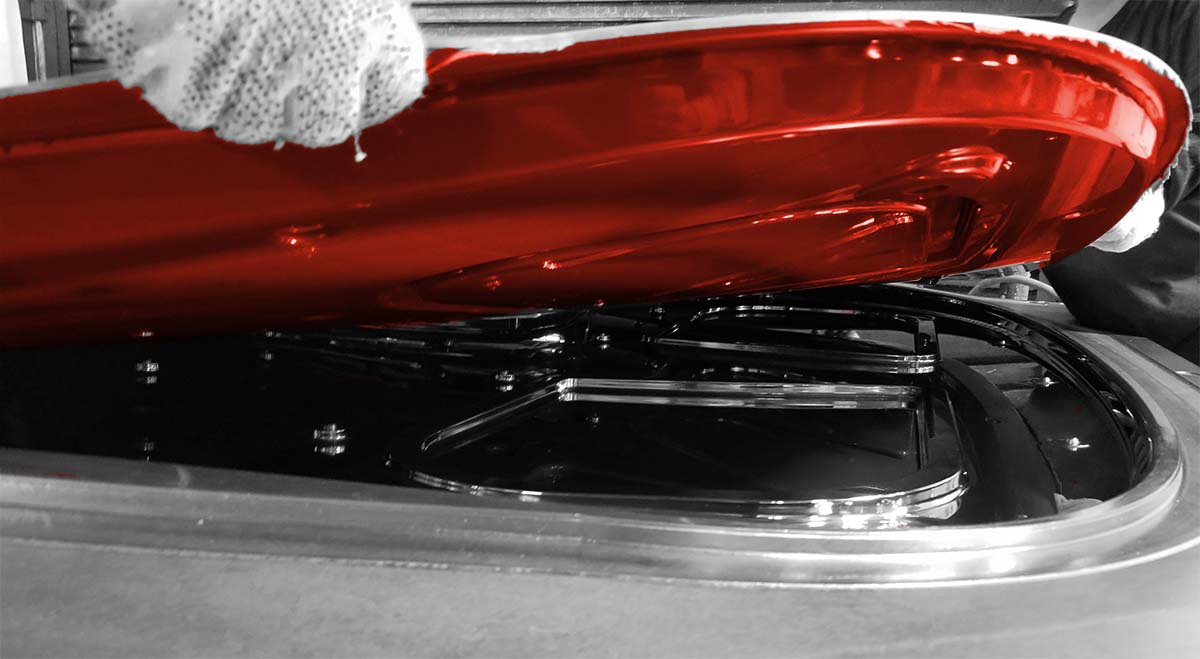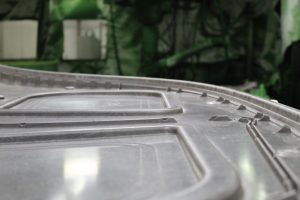-
Bigger, Stronger, Lighter™
Long Fiber Injection Molding: A complete guide - Romeo RIM
- Home
- Process Technology
- Long Fiber Injection Molding: A complete guide
- Process Technology
- 0 Comments
You need a part manufactured, but sheet molding compound is too heavy. Metal just can’t provide the complex design you require. Plastic is nowhere near durable enough, and warps at the slightest raise in temperatures.
Don’t despair! Romeo RIM has the solution you’re looking for. Only one process creates a material that is strong but lightweight, complex yet durable, and remains perfectly functional in all sorts of extreme temperatures….Romeo RIM’s signature long fiber injection.
What is Long Fiber Injection?
Long fiber injection is a process in which polyurethane resin and chopped fiberglass are poured into an open mold. Low compression pressure is then used to create complex parts in a variety of sizes.

LFI takes a two-step process and makes it one-step. A fiberglass chopper works in tandem with a sprayer dispensing polyurethane resin, creating a resin-fiber slurry that is injected directly into the open mold. This makes LFI significantly faster than the two-step processes of traditional compression molding and structural reaction injection molding (SRIM). Every part made with LFI saves time for you and your business.
LFI also avoids the problem of shear creating too-short fibers; a common danger of compression molding with SMC as LFI gets injected directly into the mold rather than cutting it into sheets or charges. Fibers used in LFI range from 0.5 inch to 4 inches (12.5mm to 100mm) in length, with the typical length of cut fibers being 0.5 to 1 inches (12.5mm to 25mm).
Benefits of long fiber injection vs. compression molding or SRIM include low material and labor cost, short completion time, the opportunity for in-mold painting, minimal to no waste, and the creation of a material which is stiff, strong, durable and resistant to warping and cracking.
Romeo RIM and LFI

In 1999, Romeo RIM became the first company to bring long fiber injection to the United States. Our first project in the States was the creation of indoor sleeper cabs for heavy trucks. Since then, we have used LFI to pioneer innovations in the automotive, agriculture, construction and spa industries.
Romeo RIM’s LFI system consists of a double shuttle system with a dimension of 12 feet by 12 feet – the largest in the world! We are able to produce lightweight, durable parts as small as 2 feet by 2 feet and as large as 11.5 by 11.5 feet, larger than any created by traditional injection molding. Multiple smaller parts can even be created at once!
We utilize high-quality, cost-effective Baydur polyurethane produced by Covestro LLC, our partner of over a decade. Using Baydur polyurethane allows our finished products to be up to 40% lighter than SMC and 60% lighter than metals such as steel or aluminum.
In addition, Romeo RIM’s LFI process is fully automated – the polyurethane-fiberglass mix is sprayed into the mold by our efficient, high-tech robot.  This allows our customers to save money by forgoing the high skilled labor costs usually associated with compression molding. It also shortens the time needed to create a completed part to as low as 120 seconds. Automating the process also reduces the amount of waste to nearly zero!
This allows our customers to save money by forgoing the high skilled labor costs usually associated with compression molding. It also shortens the time needed to create a completed part to as low as 120 seconds. Automating the process also reduces the amount of waste to nearly zero!
Our LFI system here at Romeo RIM can create everything from vehicle roofs and bodies to structural frames for personal spas. The many advantages of LFI make it a versatile process useful for producing parts in a wide range of industries. Read more about what LFI can do for you and your products below:
Stiffness, Strength and Durability
The presence of reinforcing fibers in the polyurethane causes an increase of modulus, or stiffness, when compared to other thermoplastic polymers. This increased stiffness gives LFI-produced parts a high load bearing capability, perfect for the construction, agriculture and long-haul trucking industries.
The increase in modulus also allows for parts such as automobile roofs or spa sides to be created with thinner walls, using less materials overall. This comes with a corresponding decrease in cost even for the largest and most complex of parts.
In many plastics, an increase stiffness means that the substance will become brittle, easily subject to wear, tear, warping, cracking and breaking. Brittle plastics have low impact resistance and cannot function properly with even the slightest increase or decrease in temperature. However, LFI, despite its high modulus, has none of these disadvantages as it leverages the benefits of polyurethane resins which are known for their impact and wear resistance.
In components produced using the LFI process, the reinforcing fibers create an “internal skeleton,” maintaining durability even alongside the increase in stiffness. The structure of the fibers dissipates stress forces, allowing the material to withstand heavy or repeated impact without deforming or cracking.
Romeo RIM’s LFI process creates a strong, tough material which has been impact-tested and approved for use in car roofs and the cabs of trucks and construction equipment. Our combination of LFI outer structure and an inner foam structure connected with localized composite stiffener eliminates the need for steel plating in large trucks and machinery, further saving on weight and materials cost.
Weight
In addition to its toughness and durability, LFI creates lightweight parts with an unparalleled strength to weight ratio. The benefits of strength and stiffness described above come with an 80% decrease in specific gravity when compared to steel and 60% when compared to aluminum. It’s even lighter than polymers such as SMC and fiber reinforced plastic (FRP).
In addition to the decrease in material costs, its lighter weight makes LFI an eco-friendly alternative to other traditional polymers. Decreased weight increases the fuel economy and reduces the emissions of cars, trucks, and agricultural and construction machinery. Not only do you save money up front with lowered production costs, but your LFI parts will keep saving you money for years and years as you spend less on gas!
No other metal, plastic or polymer can possibly achieve such low weight without sacrificing strength, toughness or performance. Only LFI has all of these benefits with absolutely zero downsides. But wait – there’s more!
Temperature and Corrosion Resistance
Due to the stiffness of the material and the strength of the internal fiber “skeleton,” LFI products are capable of functioning at both high and low temperatures and in all climates.
Unlike traditional thermoplastics, which warp and deform when exposed to extreme heat, LFI parts retain functionality even at temperatures reaching some thermoplastics melting point. They do not lose their impact resistance or load-bearing ability even after lengthy exposure to heat.
The same applies to cold climates – the polyurethane-fiber composite continues to bear loads and resist impact at temperatures as low as -60 degrees Fahrenheit (-50 degrees Celsius).
In addition, LFI products have a low thermal conductivity, unlike metals such as steel. The long fibers disperse heat and cold. Parts can be handled at high or low temperatures without causing discomfort for human users.
Fiber-reinforced polyurethane is also anti-corrosive and does not rust like metal or rot like wood. LFI parts resist the elements and retain form and function year after year, making them perfect for outdoor machinery and vehicles, even those used in extreme climates.
Painting, Design and Aesthetics
LFI provides the function – but what about the form? Absolutely!

The LFI setup here at Romeo RIM allows for in-mold painting, reducing the need for time-consuming post molding paint jobs. And no need for all black parts either – our paints produce bright, eye-popping finishes in any color of the rainbow!
LFI allows for Class A finishes straight out of the mold, no touchups required. Our automated process even allows for fine details and reproduction of textures. Need something glossy? LFI does the trick! How about replicating textures, such as the fine grain of wood or the roughness of stone? We can do that too!
 Beyond the paintjob, LFI can create items with excellent structural aesthetics. Our moulds allow for the creation of complex geometric structures as well as the addition of B-side geometry such as ribs and bosses. B-side geometry compliments LFI’s existing advantages by making parts even more stable and durable and saving material cost by pairing thinner walls with enhancements such as ribbing.
Beyond the paintjob, LFI can create items with excellent structural aesthetics. Our moulds allow for the creation of complex geometric structures as well as the addition of B-side geometry such as ribs and bosses. B-side geometry compliments LFI’s existing advantages by making parts even more stable and durable and saving material cost by pairing thinner walls with enhancements such as ribbing.
LFI-created products are ergonomically sound, aesthetically pleasing and functionally stable. LFI features minimal to zero shrinkage when coming out of the mold, a significant improvement when compared with plastics or even other polymers.
Other Benefits
In addition to everything listed above, LFI has even more benefits! These include:
- Radio transparency. Our LFI-created products are non-magnetic and compatible with medical technology such as magnetic resonance imaging (MRI) or computed tomography (CAT). They are also excellent for products which require Bluetooth or wireless compatibility.
LFI is a modern, affordable, cost-efficient technology which produces strong, lightweight materials suitable for a wide variety of products. Aesthetically, functionally, environmentally and financially, it stands head and shoulders above SMC, compression molding and even traditional injection molding for large parts. Contact Romeo RIM today to get started with LFI!

